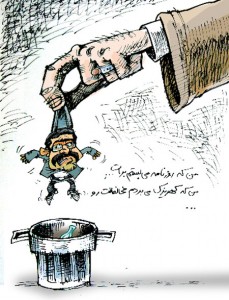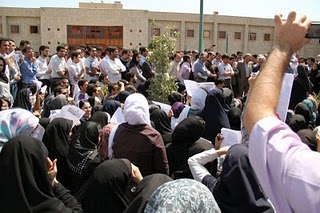The Latest from Iran (27 August): One Voice in Iran?
 Friday, August 27, 2010 at 15:20
Friday, August 27, 2010 at 15:20  2000 GMT: The Prevention of Mourning. Iranian security forces have reportedly prevented families from observing the 22nd anniversary of the mass execution of their relatives in Iranian prisons.
2000 GMT: The Prevention of Mourning. Iranian security forces have reportedly prevented families from observing the 22nd anniversary of the mass execution of their relatives in Iranian prisons.Human Rights and Democracy Activists of Iran report that security forces set up road blocks at Kharavan Cemetery and stopped the families from visiting the resting places of their kin. It is claimed that a number of people were arrested and some were beaten.
In the summer of 1988, Iran executed hundreds of political prisoners on the charge of membership in dissident groups and buried them in mass graves at Khavaran.
NEW Iran: Conservatives v. Ahmadinejad (Jedinia)
NEW Iran Special: The Supreme Leader and One Voice on Nuclear Talks with US?
The Latest from Iran (26 August): Ahmadinejad v. “Seditionists”
1920 GMT: Political Prisoner Watch. Ghorban Behzadian Nezhad, the manager of Mir Hossein Mousavi's 2009 Presidential campaign, has been sentenced to five years in prison.
1715 GMT: The President's (Suspended) Man. Robert Tait of Radio Free Europe/Radio Liberty offers a lengthy overview of the case of Presidential aide and former Tehran Prosecutor General Saeed Mortazavi, one of three officials suspended this week for alleged involvement in the post-election abuses and killings at Kahrizak Prison. Included is this observation from EA:
The speculation is whether or not as part of this unity deal [brokered by the Supreme Leader], in which Ahmadinejad and Ali Larijani would make the public appearance of making up, that they now would offer a couple of bigger names on Kahrizak....When [Iranian authorities] said 11 were guilty of some involvement with Kahrizak, including the two [people] who were condemned to death, those were all relatively low-level people and there were rumbles of dissatisfaction, not just from the families but from some folks in the conservative establishment.
1700 GMT: Political Prisoner Watch. The Guardian of London reports that Iranian authorities are preventing the children and laywer of Sakineh Mohammadi Ashtiani, sentenced to death for adultery, from visiting her in Tabriz Prison.
Ashtiani's son Sajad, 22 and daughter Saeedeh, 17, were told at the prison yesterday that their mother was unwilling to meet them. Ashtiani later said, in a phone call to Sajad, that she had been told by guards that nobody had come to visit her children had abandoned her.
Ashtiani's government-appointed lawyer, Houtan Kian, has been unable to visit her since her "confession" to involvement in her husband's murder was televised. Kian's house in Tabriz was raided this week by government officials who confiscated documents and laptops.
Ashtiani's other lawyer, Mohammad Mostafaei, was forced to flee Iran after Iranian authorities tried to arrest him.
1535 GMT: Mousavi Latest. Mir Hossein Mousavi, meeting veterans of the Iran-Iraq War, has said that today’s situation of Iranian society is “unsafe” and stressed that the only way to return safety and security is through the honouring of people’s will and their movements.
Mousavi cited fear of repression, fear of unemployment, and fear of organised corruption, all of which have become dominant in Iranian society, are signs of extensive oppression and injustice.
1530 GMT: Your Friday Prayers Update. Ayatollah Mohammad Emami-Kashani taking the podium today and he made it short and sweet.
1. Everybody turn out for Qods Day next Friday (but for Palestine and not against the Iranian Government, OK?)
2. Floods in Pakistan have been terrible and everyone should help the relief effort.
1520 GMT: Sanctions Watch. The Governor of the Central Bank of Iran, Mahmoud Bahmani, says Tehran is withdrawing its assets from European banks to counter new sanctions.
The pre-emptive measure is to counter any European decision to freeze Iranian assets, Bahmani said: "The Central Bank of Iran...had predicted such a scenarios (asset freeze) six months ago and adopted the necessary countermeasures."
1355 GMT: Political Prisoner Watch. RAHANA updates on attorney Mohammad Oliyaifard, who has been detained since 8 March. The lawyer, who represented a number of clients facing the death penalty, was sentenced to one year in prison for anti-regime propaganda after he spoke to foreign media about the execution of minors.
0945 GMT: Taking Control. Peyke Iran claims from Iranian media that all non-government organisations will be put under the supervision of police and intelligence services until the end of this Iranian year (March 2011).
0940 GMT: We have posted a separate feature from Mehdi Jedinia, "Conservatives v. Ahmadinejad".
0925 GMT: Sedition Watch. Pro-Ahmadinejad MP Zohreh Elahian, backing Ayatollah Ahmad Jannati and Minister of Intelligence Heydar Moslehi, has pronounced that foreign embassies have given part of the $1 billion allocated for "regime change" to leaders of "fitna" (sedition). Indeed, she claimed that support for the heads of "fitna" is higher than the published figures.
0915 GMT: Regime Schizophrenia "Women are Fabulous/No They're Not". President Ahmadinejad has praised the role of women in Iranian politics, saying that with four women in the Cabinet, the taboo of women in politics has been broken.
Ahmadinejad that, while Iran's women are a model to the world, 70% percent of women in households in capitalist countries are beaten but remain to keep the family together.
MP Mousa Qorbani, a member of Parliament's Judicial Commission, does not seem to have gotten the President's message, however. He has declared that when women go to work, they cause unemployment. Qorbani said that he was in Saudi Arabia and did not see a single women working there --- "if we implement this in Iran, many problems will be solved".
0900 GMT: Not-So-Tough Talk Today. Revolutionary Guard Commander Ramezan Sharif has denounced "imperialist media" for falsely portraying a threat to Iran's neighbours by publishing interviews with "virtual" commanders, trying to present a brutal face of the Revolutionary Guard. Sharif asserted that Iran's military power is only for defense and "in no way meant to menace befriended regional countries".
0815 GMT: The Battle Within. An intriguing report from Mehdi Karroubi's Saham News....
The website claims that Saeed Haddadian, a leader of Basij paramilitary groups, has publicly declared, "We no longer support Ahmadinejad and won't stand up against clerics for him."
0730 GMT: We've posted a morning special: "The Supreme Leader and One Voice on Nuclear Talks with US?"
0625 GMT: Political Prisoner Watch. Eleven days after his return to prison, former Deputy Minister of Interior Mostafa Tajzadeh has finally been able to phone his family. He said he is in good spirits and sharing a cell with journalist/filmmaker Mohammad Nourizad, who was summoned back to jail more than a week ago but has not been able to contact relatives.
0615 GMT: Qods Day. Almost a year ago Qods Day, in which many people mark solidarity with Palestine also brought --- despite the Iranian Government's attempt to suppress dissent --- one of the largest post-election demonstrations.
This year's Qods Day is next Friday, and the Green posters are appearing:

Meanwhile....
Economy Watch
Kalemeh offers a report that only 10% of state-owned companies under Iran's "privatisation" drive are actually going into the private sector. The rest are allegedly being brought by concerns connected with the Government, notably the Islamic Revolution Guards Corps.
Freedom of the Press
Iranian journalist/blogger Kouhyar Goudarzi, held in Evin Prison since December, is one of the recipients of the 2010 John Aubuchon Freedom of the Press Award, given by the US National Press Club to individuals who have contributed to the cause of press freedom and open government.
Goudarzi was one of 17 detainees who went on hunger strike earlier this month.
 Ali Larijani,
Ali Larijani,  Ayatollah Ahmad Jannati,
Ayatollah Ahmad Jannati,  Ayatollah Mohammad Emami Kashani,
Ayatollah Mohammad Emami Kashani,  Basij,
Basij,  Ghorban Behzadian Nezhad,
Ghorban Behzadian Nezhad,  Green Movement,
Green Movement,  Heydar Moslehi,
Heydar Moslehi,  Houtan Kian,
Houtan Kian,  Human Rights and Democracy Activists of Iran,
Human Rights and Democracy Activists of Iran,  Iran,
Iran,  Islamic Revolution Guards Corps,
Islamic Revolution Guards Corps,  Kahrizak Prison,
Kahrizak Prison,  Kalemeh,
Kalemeh,  Mahmoud Ahmadinejad,
Mahmoud Ahmadinejad,  Mahmoud Bahmani,
Mahmoud Bahmani,  Mehdi Karroubi,
Mehdi Karroubi,  Mir Hossein Mousavi,
Mir Hossein Mousavi,  Mohammad Mostafaei,
Mohammad Mostafaei,  Mohammad Nourizad,
Mohammad Nourizad,  Mohammad Oliyaifard,
Mohammad Oliyaifard,  Mostafa Tajzadeh,
Mostafa Tajzadeh,  Mousa Qorbani,
Mousa Qorbani,  Peyke Iran,
Peyke Iran,  Qods Day,
Qods Day,  RAHANA,
RAHANA,  Radio Free Europe/Radio Liberty,
Radio Free Europe/Radio Liberty,  Ramezan Sharif,
Ramezan Sharif,  Robert Tait,
Robert Tait,  Saeed Haddadian,
Saeed Haddadian,  Saeed Mortazavi,
Saeed Mortazavi,  Saham News,
Saham News,  Sakineh Mohammadi-Ashtiani,
Sakineh Mohammadi-Ashtiani,  Zohra Elahian in
Zohra Elahian in  Middle East & Iran
Middle East & Iran 




